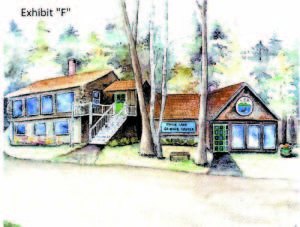LEA unveils plans for Maine Lake Science Center

MAINE LAKE SCIENCE CENTER — The former Flint lodge, off of Willett Road, nestled in a heavily wooded area abutting Pondicherry Park, will be renovated by the Lakes Environmental Association to serve as a live-in research center for post-graduate students. The intention is to attract world-class researchers to further knowledge for protecting lake water quality, and to provide an LEA education center and welcome center for Pondicherry Park.
By Gail Geraghty
Staff Writer
Nestled at the end of a long wooded driveway at 51 Willett Road is a 960 square-foot log cabin and attached garage on 17 acres abutting Pondicherry Park on two sides. Once the home of Edward and Constance Flint, the new owner, Lakes Environmental Association, plans to transform the property into a science and education center to attract world-class researchers, dedicated to furthering the cause of lake science and the world of nature.
LEA Executive Director Peter Lowell unveiled the plans for the Maine Lake Science Center to the Bridgton Planning Board Tuesday.
Forty years after it was formed, LEA is “feeling the urge to study our lakes much more intensively†to study the myriad factors that cause lake degradation, said Lowell. “We don’t know the tipping point†at which a lake can take no more, he said.
The main residence will provide a three-bedroom housing unit to attract post-graduate students and other researchers, along with a conference room, a workspace and lab. The garage will be transformed into a new education center for LEA classes and workshops, and will also serve as a welcome center for Pondicherry Park.
Lowell said he spoke with professors from the University of Southern Maine Monday about the new science center, which would be a first for the state. “They’re all jacked up†with enthusiasm about the plans, said Lowell, and are already brainstorming about helping with its development through grant funding.
LEA also plans to construct a 100-foot trail link across park property to connect the education center with Stevens Brook Elementary School via the Ham Memorial Bridge. The organization also wants to provide a link to the park’s Hospital Loop Trail from the north side of the center. Low-impact hiking trails will also be blazed on the former Flint property that would integrate with Pondicherry Park trails.
The driveway to the log cabin is 900 feet long, and its entrance from Willett Road, just beyond the town garage, also serves as the entrance to Pondicherry Park. The park trail veers off from the driveway, however. Lowell said he envisions improving the entrance with parking for seven cars. In addition, parking would be provided by two parking “pods†at separate points along the driveway, and space would be cleared beyond the lodge for a 48’ x 60’ paved parking area. A new 300-foot driveway would be built to connect the parking area to the driveway.
The driveway is just 12-feet wide, but plans are to build it up to allow the road to drain to adjacent vegetation, and to replace and enlarge the three existing culverts.
“The road that exists is in very good shape,†said Lowell. Insofar as possible, LEA wants to preserve the property’s “woodsy feel.â€
Lowell said he spoke with Public Works Director Jim Kidder, who recommended trimming trees and bushes at the entrance and shoulders, along with mowing grass at the shoulders, to allow for school bus and emergency vehicle passage. A large maple tree near the center will need to be removed to create a hammerhead turn adjacent to the paved parking area.
Lowell said Fire Chief Glen Garland signed off on the floor plan of the main lodge after LEA agreed to house researchers with three bedrooms, a sitting area, bathroom, kitchen area and computer and wet lab on the ground floor. Lowell said most graduate and post-graduate students don’t have a lot of money, and providing housing will provide an attractive incentive to come to Bridgton. A science center at Lake Sunapee, N.H. also provides housing for researchers, he said. On the second floor of the main lodge will be a 25’ x 33’ conference room able to seat up to 40 people.
The 670-square-foot attached garage will house a classroom for up to 30 students and two teachers, with space set aside for a butler’s kitchen and bathroom, as well as a welcome center for the park. LEA reaches over 1,000 K-9 students in the Lake Region each year, said Lowell, and the education center will allow LEA to reach even more students, who would be bussed in from surrounding districts.
“The Flint property will expand opportunities for field training and classroom work on a single campus, because of its diverse natural features,†Lowell said.
The lodge is currently served by both power and water, but a new septic system will need to be installed to handle increased flows. Lowell said wireless Internet access will also be necessary, and he isn’t sure yet how that will be provided. There will be a sign at the entrance on Willett Road, and another sign on the lodge building.
New Planning Board Alternate Phyllis Roth asked whether the center is intended to attract more tourists to Bridgton.
“That isn’t the primary purpose, but they’ll certainly be welcome there,†said Lowell.
Board member Mike Figoli said, “This is a great concept. I’m very glad you’re bringing it to us.â€
Asked about the possibility for expansion at the site, Lowell said, “We’re trying to keep an open mind.†LEA owns several other parcels, including over 500 acres at Holt Pond, and will investigate opportunities as they arise, he said.

